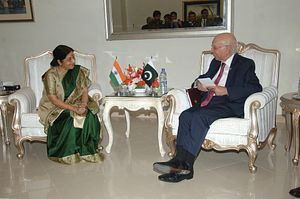Indian External Affairs Minister Sushma Swaraj will meet Sartaj Aziz, foreign affairs advisor to Pakistan’s prime minister, on the sidelines of the upcoming South Asian Association for Regional Cooperation (SAARC) ministerial meeting in Pokhara, Nepal. The meeting is scheduled to take place on March 16 and 17. Confirmation of Swaraj’s plans to meet with Aziz come just over a week after Indian Foreign Secretary S. Jaishankar met his Pakistani counterpart Ahmad Aizaz Chaudhry in Islamabad, as part of India’s outreach to SAARC members ahead of the upcoming Pokhara meeting. During that meeting, Jaishankar delivered a letter from Indian Prime Minister Narendra Modi for his Pakistani counterpart.
According to a spokesperson for Pakistan’s Foreign Office, Islamabad is looking to have Aziz bring up the issue of Modi’s participation in the 19th SAARC Heads of State and Government Summit, which Pakistan will be hosting later this year. “Aziz had sought a meeting to extend the invitation for Prime Minister Narendra Modi to attend the 19th SAARC Summit and India in all likelihood will go ahead with the meeting,” said Indian sources who spoke to the Indian Express. In December, Swaraj had confirmed Modi’s intent to travel to Pakistan. “He will be coming,” she told reporters at the time.
It’s unclear for the moment if Swaraj and Aziz will hold a meeting addressing the broader India-Pakistan bilateral agenda. The two countries resumed their Comprehensive Bilateral Dialogue (CBD) late last year. In December, Swaraj had met with Aziz and Pakistani Prime Minister Nawaz Sharif in Pakistan in December 2015, on the sidelines of the ‘Heart of Asia’ conference on Afghanistan. Just days before Swaraj’s bilateral meetings in Pakistan, the national security advisers of India and Pakistan, Ajit Doval and Nasir Khan Janjua respectively, met in Bangkok.
This flurry of high-level diplomatic activity helped lay the groundwork for an expected stopover by Narendra Modi in Lahore, Pakistan on December 25, 2015. Modi met with his Pakistani counterpart and the visit was a read as a sign suggesting that the political leadership in both countries was invested in seriously carrying forward with the CBD in 2016. Modi and Sharif resolved to have their foreign secretaries meet in January to carry the positive momentum from the end of 2015 into this year.
In early January, militants staged a major attack on the Indian Air Force base at Pathankot, near the India-Pakistan border in Punjab. The attacks at Pathankot, which India claims were orchestrated by Pakistan-based militants belonging to Jaish-e-Mohammed, delayed the scheduled talks. India and Pakistan kept open channels of communication in the wake of the attack and Islamabad purported to cooperate with New Delhi on the investigation. Pakistan filed a First Information Report (FIR), opening a case into the Pathankot attacks and thereby reopening the path to high-level talks with India. A Special Investigation Team from Pakistan is slated to visit the site of the attack soon to gather evidence to assist the ongoing probe into the attack.
With Swaraj and Aziz set to meet later this week, we’ll likely learn more about where the India-Pakistan bilateral may be headed in the coming months. A resumption of regularly scheduled talks between the countries’ foreign secretary and national security advisers would be a positive sign, affirming that attempts a spoiling bilateral rapprochement can only go so far. Swaraj is likely to reaffirm Modi’s participation in the SAARC Summit later this year in Pakistan would offer an opportunity for an official meeting between him and Sharif on the the CBD.

































